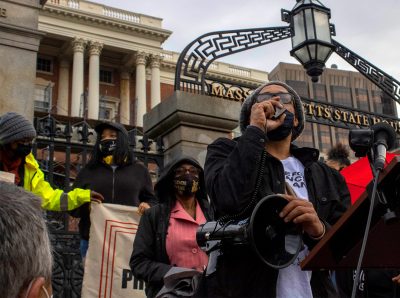Dozens of activists gathered in front of the Massachusetts State House Wednesday for a press conference organized by Mass Action Against Police Brutality about the Derek Chauvin verdict.

There, they demanded the reopening of several police brutality court cases in Massachusetts they say were unjustly handled.
The conference took place one day after Chauvin, a former Minneapolis police officer, was found guilty on all three counts for the murder of George Floyd.
Brock Satter, the co-founder and organizer of Mass Action Against Police Brutality, joined the families of Terrence Coleman, Burrell Ramsey-White and Juston Root, who were all fatally shot by Boston police officers in recent years.
“This is much bigger than George Floyd, it’s much bigger than Derek Chauvin,” Satter said. “We demand further, complete justice … We want to take up the cause of the families here in this state and the families here in this city.”
Carla Sheffield, Ramsey-White’s mother, lost her son in 2012 after he was stopped by police for a routine traffic stop and fatally shot by Boston Police officers who say they mistook him for someone they had a warrant out for.
An independent review by the Suffolk County District Attorney found the officer who shot Ramsey-White “acted in self-defense against a deadly threat,” according to a 2013 press release.
Sheffield condemned the investigation.
“I feel like they investigated to clear the officer, not for the truth,” Sheffield said. “The evidence was not followed.”
At the press conference, Sheffield spoke out against the Boston Police Department, and demanded that her son’s case be reopened and investigated “properly.”
“To see them tell you to follow these laws but they can skirt them,” Sheffield said, “Because they wear a blue uniform, because they carry a badge, because they don’t feel like telling you their name, because they’re having a bad day, we have to fear for our Black sons, whether they’re going to see another day.”
Sheffield ended her speech by congratulating the Floyd family on receiving justice for their son and demanding the families of the victims of police brutality in Boston receive the same justice.
Jennifer Root Bannon’s brother, Juston Root, was killed by police in February 2020. Juston Root was diagnosed with schizoaffective disorder and had a history of paranoia. He was shot to death by police officers, who say he took out what they thought was a firearm, but later was determined to be a plastic paintball gun.
“When police murder innocent people, we must continue holding our leaders accountable to us and accountable to the truth,” Root Bannon said. “We must continue having the courage to keep believing that convictions don’t have to be rare.”
In the last year alone, 983 people have been shot and killed by police, according to the Washington Post’s Fatal Force Database. But from 2005 to 2020, only 42 U.S. nonfederal police officers were arrested after shooting on-duty, and only five were convicted of murder, according to Statista Research Department.
At the press conference, Root Bannon called for justice for victims of police violence.
“We can’t have them back,” she said, “but we can have accountability and that accountability can start to bring the justice that’s deserved.”
Howard Rotman, a resident of Dorchester and a former leader of 1199SEIU at Boston Medical Center, the largest healthcare union in America, said he attended the press conference in support of the movement.
“I am against the systemic racism that’s been part of the country’s history,” he said. “I’ve been fighting racism and repression of Black people and people of color.”
Rotman said the guilty verdict in the George Floyd case was a big victory for other police brutality cases but there is still a lot more to do.
“It’s really one of the biggest victories, but it’s not the end,” he said. “It’s just like the other case going on in Minnesota as well … it’s an ongoing thing, non-stop.”
Sowan Park and Hannah Mohtadi, two sophomores from Northeastern University, attended the press conference together to show solidarity.
“I think it’s very important for the families of the victims to have their stories heard, and talk about police accountability, police brutality,” Park said, “and especially locally and with the Boston Police Department.”
Park and Mohtadi both said their biggest takeaways from the conference was how often police officers used excessive force when it was not required.
“There were two different stories where mental health was the initial reason that the police became involved,” Mohtadi said. “It just shows that they’re not the adequate resource to help in those situations, and that a lot of times they make those situations worse.”
Park also mentioned the rarity of a guilty verdict for police brutality — which she said made Chauvin’s conviction a relief.
“Even though it was clearly a murder, the fact that we were nervous that he could potentially get away with it, I think that really shows the real problem and how there is no police accountability in the U.S.,” Park said. “I think this was a really big step.”






















































































































